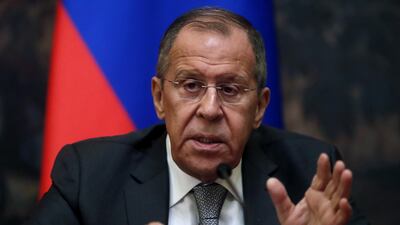Russia’s Foreign Minister Sergey Lavrov said on Wednesday he had received assurances from officials in Ankara that Turkey would not launch a fresh offensive in northern Syria in what appeared to be a u-turn from Turkish promises made earlier this week.
Mr Lavrov said Turkish government officials had explained that comments about a new Syrian offensive were a “misunderstanding.” Russia’s foreign minister added that neither Turkey’s foreign minister nor its the presidential spokesperson had spoken “about any resumption of the Peace Spring operation."
On Monday, Turkey’s Foreign Minister Mevlut Cavusoglu told the state-run Anadolu news agency that Turkey would launch a new military offensive in northern Syria if it was not cleared of Kurdish fighters.
His comments follow a Russian-brokered deal last month between Turkish leader Recep Tayyip Erdogan and the regime of Bashar Al Assad to allow Turkish troops to establish a buffer zone some 30 kilometres deep into Syria clear of Kurdish fighters.
Turkey considers the YPG Kurdish militia in northern Syria to be a national security threat because of the group’s links to the PKK, an armed Kurdish group in Turkey which has fought an insurgency there for several decades.
Mr Cavusoglu claimed on Monday the offensive was necessary because Russia and the United States had failed to make good on their pledges as part of the deal to remove the Kurdish fighters from the buffer zone.
However, Russia's Defence Ministry on Tuesday said it was puzzled by Cavusoglu's statement on several different levels and that Moscow had carried out in full its obligations under the Putin-Erdogan deal.
"Thanks to a range of measures implemented by the Russian Federation, it was possible to significantly stabilise the situation," Maj Gen Igor Konashenkov, a spokesman for the Russian Defence Ministry, said.
"The head of the Turkish Foreign Ministry's call for military action can only escalate the situation in northern Syria rather than sort things out in the way set out in a joint memorandum signed by the presidents of Russia and Turkey," Mr Konashenkov added.
Despite backing opposing sides in the conflict in Syria, Turkey and Russia alongside Iran have emerged as key players in negotiating an end to the eight-year war.
Russia’s deal last month that paved the way for Turkey to establish a security buffer zone has cemented Russia's role as the guarantor of the Syrian regime, particularly following the US pullout of American troops from the region.
President Donald Trump’s decision to redeploy US forces from Syria to Iraq was heavily criticized by both Democratic and Republican lawmakers in Washington, as well as Kurds who said the withdrawal was leaving them vulnerable to ethnic cleansing by Turkish forces. A small contingent of American soldiers has remained in Syria to prevent Mr Assad’s forces from gaining access to oil infrastructure.
Footage circulated across social media last week of Russian troops taking over abandoned US military bases, leading US politicians to accuse Mr Trump of ceding American influence in Syria directly to its main rival, Russia.
Meanwhile, joint Russia and Turkish patrols, which have filled the power vacuum in the wake of the US withdrawal, have been filmed by local Kurdish news outlets being pelted with stones and Molotov cocktails.

